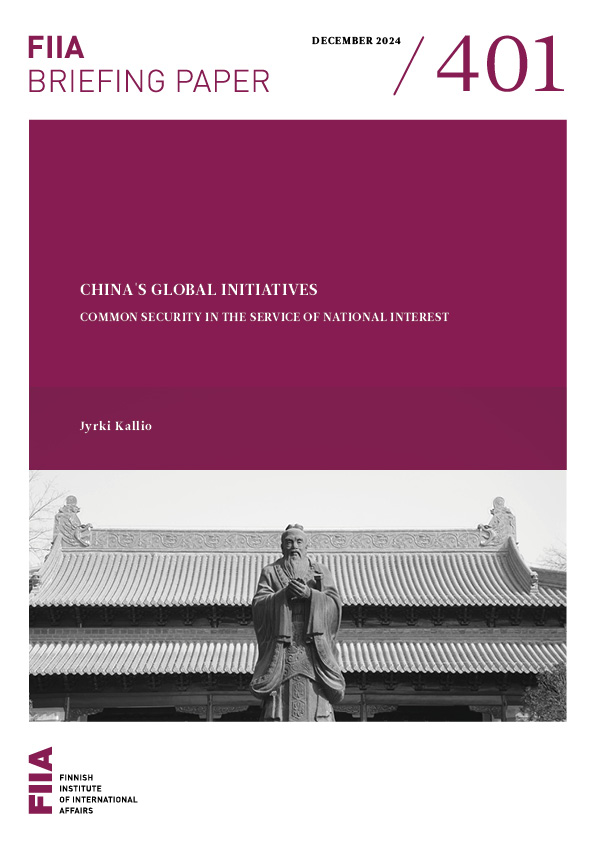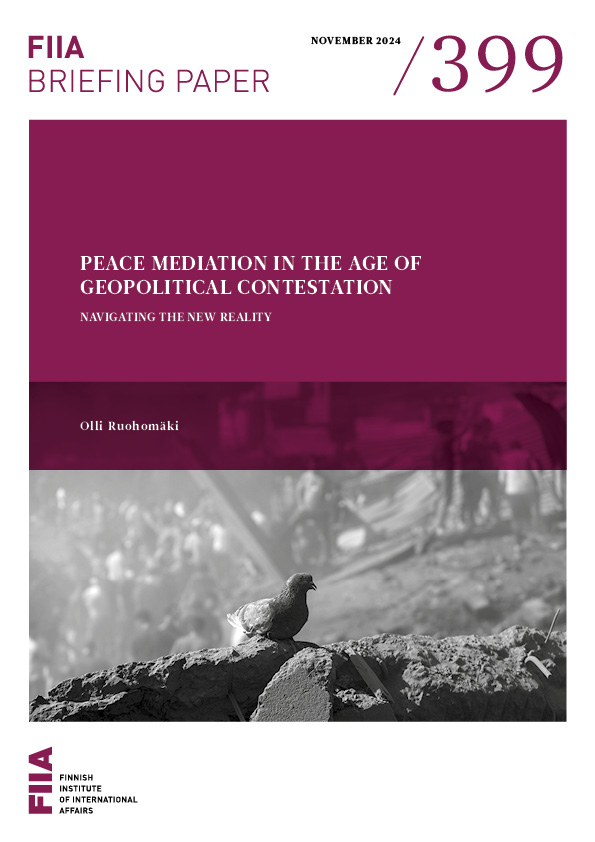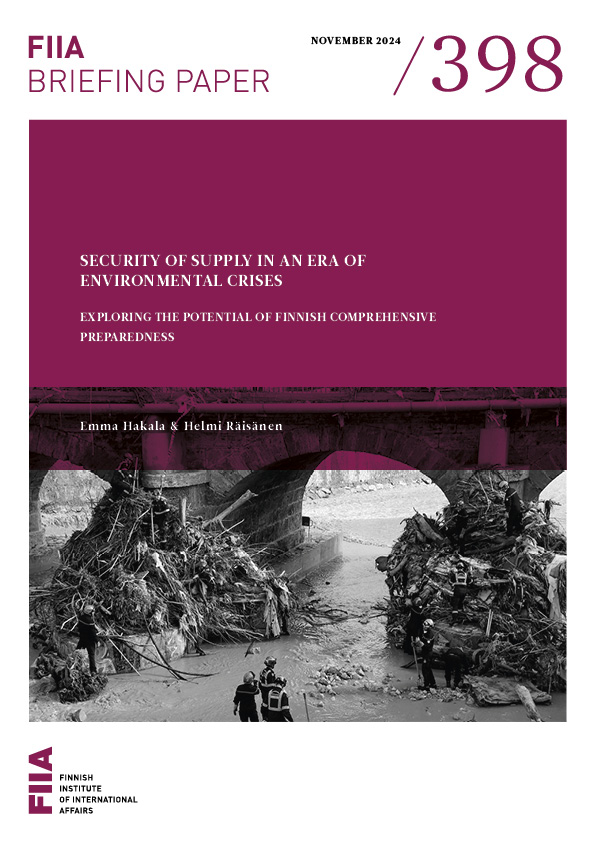The Organization for Security and Cooperation in Europe (OSCE), which last year celebrated the 40th anniversary of the Helsinki Final Act, is often asserted to be in a crisis. This is due to Russia’s revisionist foreign policy which violates the core principles of the OSCE. Russia wants to radically re-shape the organisation’s values, priorities, and modus operandi.
The United States is worried by Moscow’s apparent push to end the autonomy of key OSCE institutions like ODIHR, the Representative for Freedom of the Media (RFM), or the High Commissioner on National Minorities (HCNM).
While the US remains ready to engage with Russia, Washington wants to base this engagement purely on the principles of the Helsinki Final Act and OSCE acquis.
Despite its frustration with Russia’s policies, the US will likely pursue even more intensive engagement in the OSCE, not less. That would involve putting ”big issues” – such as the refugee crisis, energy security, or counter-terrorism – on the table, in the hopes that a breakthrough on any of these issues would lead to agreement on structural OSCE issues such as a legal personality and long-term budget.
Is the Organization for Security and Cooperation in Europe (OSCE), as is often asserted, in crisis? Or is the OSCE merely facing normal mid-life challenges? Could it be the victim of unrealistic expectations arising from earlier successes? Might the organization even have a multi-faceted personality, with parts of it underperforming or even dysfunctional, while other units continue to excel? How does the United States, the OSCE’s largest financial contributor and one of the most actively engaged of its 57 participating States, view Russian proposals to change the organization? Finally, what is the likely U.S. policy toward the OSCE in the near future?
In 2015, the OSCE celebrated the 40th anniversary of the signing of the Helsinki Final Act, a seminal event in the history of twentieth-century Europe. The product of nearly three years of negotiations within the framework of the newly created Conference on Security and Cooperation in Europe (CSCE), the Final Act was signed in the Finnish capital on August 1, 1975 by 33 European heads of state or government, the Prime Minister of Canada, and U.S. President Gerald Ford. The Final Act contained several commitments in three areas or “baskets”: political and military; economic and environmental; and human rights.
The first basket laid out the “Helsinki Decalogue,” ten fundamental principles designed to govern behavior of states toward each other and toward their citizens: Sovereign equality, respect for the rights inherent in sovereignty; Refraining from the threat or use of force; Inviolability of frontiers; Territorial integrity of States; Peaceful settlement of disputes; Non-intervention in internal affairs; Respect for human rights and fundamental freedoms, including the freedom of thought, conscience, religion or belief; Equal rights and self-determination of peoples; Co-operation among States; and Fulfilment in good faith of obligations under international law.
Beauty is in the eyes of the beholder, and the opposing sides in the Cold War viewed the Helsinki Final Act in diametrically different ways, a dichotomy which to some extent has persisted until today. This historical background is vital for understanding the current OSCE as contestations and challenges have re-emerged. It is vital for understanding US views on the organization. An important part of this legacy is the rationale, because of its clauses on the inviolability of national borders and respect for territorial integrity, the U.S.S.R. under Leonid Brezhnev took the Helsinki Final Act as a confirmation of post-war Soviet domination of Eastern Europe through subservient national communist parties. Many conservatives in the U.S. interpreted the Final Act in a similar manner and in a futile effort, therefore, urged President Ford not to sign. Ford did not heed their advice.
History would confirm Ford’s judgment and prove both Brezhnev and conservative Western skeptics wrong. As Yale historian John Lewis Gaddis has written: “[the Helsinki Accords] gradually became a manifesto of the dissident and liberal movement. … What this meant was that the people who lived under these systems—at least the more courageous—could claim official permission to say what they thought.”1 Helsinki committees sprang up in several Central and Eastern European countries and, citing the signatories’ commitments to transparency, civil and human rights, and the non-violent resolution of disputes, they publicly held their governments’ feet to the fire and thereby substantially contributed to the downfall of communism a decade-and-a-half later. This outcome and the background logic legitimized the CSCE for the many in the US.
After the signing of the Helsinki Final Act, the CSCE was tasked with monitoring compliance with the Accords and planning and holding follow-up conferences. Some of the conferences turned out to be multi-year affairs (Belgrade 1977-78; Madrid 1980-83; Vienna 1986-89), while other conferences and specialized meetings lasted for much shorter periods. In general, the Soviet Union attempted to focus the CSCE’s agenda exclusively on political and military issues (Basket One), while the United States and several of its allies insisted on examining human rights compliance under Basket Three. Basket Two dealing with economic and environmental issues received the least attention. Ultimately the idea of “common and comprehensive security” became a centerpiece of CSCE thinking.
The collapse of communism in Central and Eastern Europe dramatically altered the CSCE. In June 1990, a half-year after the Berlin Wall was breached, the CSCE held a four-week meeting of the Conference on the Human Dimension in Copenhagen. It is noteworthy that the meeting, which dealt with Basket Three issues, used the terminology “human dimension” instead of “human rights,” in order not to offend the Soviets. The mood in Copenhagen was decidedly upbeat.2 Starting with Poland in 1989, the countries of Central and Eastern Europe had ousted their communist regimes, and by the summer of 1990 all of them had been replaced by democratically elected governments. Moreover, German unification was already high on the agenda. In fact, the Copenhagen CSCE meeting was the last international conference to which the German Democratic Republic (East Germany) sent a delegation, the majority of whose members were clergy.
The delegates hammered out the Copenhagen Document that significantly advanced the protection of a number of human rights and fundamental freedoms, such as the right to peaceful assembly and demonstration, the right peacefully to enjoy one’s property, and the rights of the child. The Copenhagen Document also introduced far-reaching provisions regarding national minorities and broadened the scope of human rights matters to include commitments to hold free and fair elections.
Six months later the CSCE convened a summit meeting in Paris, which produced the Charter of Paris for a New Europe, effectively ending the Cold War. In its lofty ambitions to reshape Europe by including the formerly communist-ruled countries, the Charter has been likened to the 1815 Congress of Vienna and the 1919 Versailles Conference. It was a moment of great optimism that was strongly embraced by the US.
The Charter locked in the provisions of the Copenhagen Document by beginning the creation of an institutional structure, which culminated in the changing of the name of the CSCE to the Organization on Security and Cooperation in Europe (OSCE), effective 1995.3 From 1974 to 1990 the CSCE had functioned as one continuous conference. The Charter of Paris for a New Europe established an Office for Free Elections (later renamed Office for Democratic Institutions and Human Rights, ODIHR) in Warsaw, a Conflict Prevention Center in Vienna, and a secretariat. In 1992, a Secretary General was also appointed. The Charter also established three main political, consultative bodies: the Council of Ministers, consisting of foreign ministers from the participating States; a Committee of Senior Officials to assist the Council and manage day-to-day business; and regular summit meetings of heads of State or Government.
Frustration over the powerlessness of the OSCE
A CSCE Parliamentary Assembly, whose creation was called for in the Charter of Paris, was launched in Madrid in 1991. It first met the following year in Budapest and soon found a permanent home in Copenhagen. The High Commissioner on National Minorities (HCNM), the Hague-based OSCE institution regarding the protection of minorities, was created during a CSCE Follow-up Meeting in Helsinki in 1992. The Office of the OSCE Representative on Freedom of the Media was established in December 1997 and located in Vienna.
The OSCE Human Dimension Implementation Meeting (HDIM) is a human rights and democracy conference that has been held by ODIHR every fall in Warsaw since the early 1990s. The two-week meeting is attended by more than 1,000 government representatives, international experts, non-governmental organizations, and human rights activists and is considered to be Europe’s largest human rights conference.
The OSCE also deploys some twenty field missions, most of them in Southeastern Europe, Eastern Europe, the South Caucasus, and Central Asia. These operations are established at the invitation of the respective host countries, and their mandates are agreed by consensus by the participating States. Projects range from conflict prevention, initiatives to support law enforcement, minority rights, legislative reform, the rule of law, and media freedom to the current Special Monitoring Mission (SMM) in the conflict area of eastern Ukraine.
The OSCE’s regular decision-making bodies, the Permanent Council and the Forum for Security Cooperation, based in Vienna, hold weekly meetings of the ambassadors of the 57 OSCE participating States. A Ministerial Council meets annually to review the organization’s activities and provide guidance. At the highest level, summit meetings of heads of state are held periodically. To date, there have been seven CSCE/OSCE summits: Helsinki 1975, Paris 1990, Helsinki 1992, Budapest 1994, Lisbon 1996, Istanbul 1999, and Astana 2010.
So, why with this impressive institutional history and imposing bureaucracy is the OSCE in crisis? The answer lies in the larger geopolitical realm in which the 57 participating States exist. The overwhelming US view is that the reality of today’s Europe has changed. Russia – led by Vladimir Putin, who has consolidated domestic power in an authoritarian manner – is seen as an openly revisionist power in international affairs. As Dmitri Trenin, Director of the Carnegie Moscow Center, wrote in mid-October 2015: “Starting with Ukraine in 2014, Russia has broken out from the post-Cold War order dominated by the United States. In Eastern Europe, the Kremlin was insisting on its right to a sphere of privileged interests in what it terms as ‘the Russian world’ and a security buffer between Russia and NATO.”4 In Washington and in many other Western capitals this behavior reminds them of the early history of the organization, especially how its mission was construed by the Soviet Union.
For intrinsic reasons and because the OSCE was instrumental in promoting the human dimension contrary to the Soviet aims, Washington views as unacceptable a possible abandonment or paralysis of this basket of the organization. The post-Cold War order, largely shaped by the OSCE, means one based upon the rule of law, international agreements, open societies, liberal values, and freedom of expression. In the US, there remains deep disappointment and outrage at Russia’s having violated it.
It is vital to understand that Russia’s break-out of the post-Cold War order is grounded in a culture war. Moscow, through a vastly increased and sophisticated propaganda machinery, portrays the Euro-Atlantic West as decadent, and Russia as the defender of traditional, Christian morality. If Russia is to have allies, they must be fellow authoritarians like Syria’s Bashar al-Assad, China’s Xi Jinping, or even Iran’s clerical regime. So talk of “leaving the door open” for Russia to “rejoin Europe” is somewhat beside the point.
Lord Browne of Ladyton, former U.K. State Secretary for Defence, declared last fall that the OSCE “lacks the political mandate to address, let alone resolve, core issues.”5 In Washington many are asking why the OSCE has been so de-fanged. The main US views focus on the Russian strategic aim to break the status-quo that the OSCE embodies: As part of its revisionist agenda, the Russian Federation wants to radically re-shape the OSCE’s values, priorities, and modus operandi. This challenge to OSCE norms has created a situation that goes far beyond an organizational “mid-life crisis.” Although not abandoning all hope for the OSCE, Barack Obama’s administration is unwilling to compromise on the organization’s fundamentals.
Challenges of Arms Control
In arms control, one vital element of the OSCE’s mandate, negotiations on an Adapted Treaty on Conventional Armed Forces in Europe (the adapted CFE treaty) have collapsed. The original CFE Treaty was highly successful in dramatically reducing the level of heavy conventional armament on the continent. An adapted treaty, which took into account the different geopolitical situation of the post-Cold War era by setting national instead of bloc-based limits on conventional armed forces, was signed at the 1999 Istanbul OSCE summit. NATO members, however, would not ratify the treaty as long as Russia refused to withdraw all its troops from Moldovan and Georgian territory. In 2007, after Russia opposed American missile defense plans, President Putin announced a suspension of its CFE Treaty obligations. In 2009-10 the U.S. tasked a special envoy to try to revive the treaty, but negotiations foundered upon Russia’s refusal to agree to a “host nation consent” clause for the stationing of one country’s troops on another’s soil. Finally, in March 2015 the Russian Federation announced its decision to completely halt its participation in the CFE Treaty.
[caption id="attachment_80766" align="alignleft" width="512"] The author speaking as head of the US delegation at the 2009 OSCE Human Dimension Implementation Meeting (HDIM). Photo: USOSCE Staff.[/caption]
The author speaking as head of the US delegation at the 2009 OSCE Human Dimension Implementation Meeting (HDIM). Photo: USOSCE Staff.[/caption]
Another important, but weakened OSCE arms control vehicle is The Vienna Document, an agreement intended to implement confidence and security building measures such as an annual exchange of military information about forces located in Europe, prior notification and observation of military activities, an exchange of annual calendars, and compliance and verification through inspections. The war in Ukraine and Western counter-measures have led to Russia’s reducing its level of activity to the point of leaving an empty chair in several discussions of revitalizing The Vienna Document.
US views Russia as an obstructionist actor
Washington is appalled, although hardly surprised, by Russian obstructionism when it comes to the human dimension. An unpleasant ghost of the past, the Kremlin’s behaviour is hampering some of the key OSCE achievements. Within the OSCE structure, Moscow is pushing to curtail the autonomy of key institutions like ODIHR, renowned for its highly professional election monitoring; the Representative for Freedom of the Media (RFM), or the High Commissioner on National Minorities (HCNM). Moscow also wants to fundamentally alter the annual Human Dimension Implementation Meeting by vetting and censoring non-governmental organizations, to which the HDIM accords a unique role, and to restrict the mandate of OSCE field operations, using as a model its stubborn refusal of full access to the Special Monitoring Mission in Ukraine.
The U.S. views with grave concern Moscow’s demand that each of these autonomous units be run on a consensus basis, which, if implemented, would grant The Russian Federation a veto over their activities.
There is no chance whatsoever that the United States will agree to any of these changes, which would negate the fundamental values of the Helsinki Final Act. Even if it did, there is no way that several European allies of the U.S. would agree to them.
It is important to note that Russia’s revisionist agenda aiming at a restructuring of European security is totally at variance with a whole range of solemn commitments that Moscow has made. The most recent was the Astana Commemorative Declaration Towards a Security Community, which Russia signed on December 3, 20106 and which states, for example:
“We reaffirm the inherent right of each and every participating State to be free to choose or change its security arrangements, including treaties of alliance.” (Art. 3) In other words - and this is critically important for Finland and Sweden to understand - NATO enlargement, or for that matter the enlargement of the Russian-led CSTO (Collective Security Treaty Organization), is perfectly legitimate.
“Within the OSCE no state … can consider any part of the OSCE area as its sphere of influence.” (Art. 3) This is, of course, precisely what Russian Prime Minister Dmitry Medvedev, when he was President, advocated.7
“We pledge to refrain from the threat or use of force in any manner inconsistent with the purposes and principles of the Charter of the UN or with the ten Principles of the Helsinki Final Act.” (Art. 7) It scarcely needs mention that Russia’s invasion of Ukraine violates this pledge.
It was widely reported that in 2012, frustrated with Russian obstructionism, Canada seriously considered completely withdrawing from the OSCE and was only talked out of this move by its closest allies, principally the U.S.8
The United States shares the frustrations of its northern neighbor at Moscow’s ability to seriously impair the functioning of the OSCE. Washington is also perturbed with several European members who seem to confuse “dialogue” with “agreement” and whose idea of dialogue with Russia is essentially “Can’t we really get along?” The U.S. totally rejects “dialogue for dialogue’s sake.” Washington remains ready to engage with Russia. But The Obama administration does not see any point of basing this engagement on any other principles than those of the Helsinki Final Act and OSCE acquis.
More intensive U.S. engagement, not less
Despite its frustration, however, Washington’s policy will likely be even more intensive engagement in the OSCE, not less. That would involve putting “big issues” on the table like:
• the refugee crisis
• energy security
• counter-terrorism and combatting transnational crime
• enhanced intelligence-sharing
• a renewed commitment to improving the Vienna Document and other confidence and security building mechanisms
• confronting a likely economic and social crisis in Central Asia
• pursuing dialogue with Iran
The U.S. might even propose the creation of a Special Coordinator for Refugee Issues and perhaps one for anti-crime activities. It will continue to propose and support as many initiatives as possible on civil society. The logic behind this counter-intuitive move on ”big issues” is that if there were a breakthrough on any of these thorny problems it would lead to agreement on structural OSCE issues such as a legal personality and long-term budget. It would also put the choice to Russia of either cooperating or saying no to constructive proposals with wide backing throughout the OSCE.
The U.S. has high expectations for Germany’s Chairmanship-in-Office and is already strongly supporting it. This includes noting that in the absence of consensus within the OSCE, the German Foreign Minister has the statutory right to act, for example in the management of field missions.
Washington views the coordination of OSCE policy on the war in Ukraine as a great achievement. Hence, it will vigorously support Berlin in continuing to leverage OSCE tools in Ukraine, especially insisting that Russia allow unrestricted access to the OSCE Special Monitoring Mission and to allow Kyiv to re-establish control over the entirety of its national boundaries. In post-conflict situations, the U.S. will insist on not pre-emptively holding ODIHR back from election monitoring anywhere. Finally, the U.S. will push hard for selecting a strong Chairman-in-Office for 2018, such as Canada or possibly Poland.
The OSCE set up an Eminent Persons Group of 15 individuals, one of whom was Dr. Teija Tiilikainen, Director of the Finnish Institute of International Affairs. In June 2015 the Group issued an interim report with five recommendations, which included prioritizing conflict prevention, strengthening the office of Secretary General, resolving the question of the OSCE’s legal personality, moving field operations in the direction of de-escalation and reconciliation, and enhancing the OSCE’s operational capability through greater planning capacity and stronger international partnerships.9
The Eminent Persons Group’s final report in late autumn 2015 did not propose any new principles or institutions. Instead it called for “a return to diplomacy; a robust diplomatic process designed to replace mutual recrimination with rebuilding trust: not military activity, not propaganda, not rhetoric – but a process that explores our common problems carefully, confidentially and systematically.”
Any organization is only as strong and efficient as its members, and the OSCE is no exception. The U.S. is committed to remaining one of the most active of the 57 participating States. But the OSCE is hobbled by a lack of enforcement mechanisms, relying rather on continuous dialogue and the power of publicity (such as the HDIM’s “naming and shaming” of human rights violators). Without the will to enforce existing OSCE norms, and as long as several of the major participating States have diametrically opposed political agendas, the OSCE is likely to remain a struggling organization with a few highly productive units, but with a deadlocked core that is hostage to the wider political cleavages the organization was created to bridge.
Endnotes
1 John Lewis Gaddis, The Cold War: A New History. New York, NY, 2005: Penguin Press, p. 190.
2 This author was a member of the U.S. Delegation at the Copenhagen Conference and can attest to a remarkable spirit of cooperation and willingness to compromise.
3 It is interesting that Ambassador Max Kampelman (1920-2013), known as “Mr. CSCE” for his role in leading several U.S. delegations to multi-year CSCE meetings, was opposed to giving the CSCE a permanent organizational structure, which he feared would rob the organization of flexibility.
4 Dmitri Trenin, ”Putin’s Syria Gambit Aims at Something Biggerthan Syria,” Carnegie Moscow Center, October 13, 2015.
5 Lord Browne of Ladyton,”Challenges of Euro-Atlantic Security – A European Perspective from an American Base”, speech delivered at the Finnish Institute of International Affairs, October 20, 2015.
6 Astana Commemorative Declaration Towards a SecurityCommunity, December 3, 2010, OSCE, http://www.osce.org/mc/74985?download=true
7 Andrew E. Kramer, “Russia Claims Its Sphere of Influence in the World,” August 31, 2008, New York Times, http://www.nytimes.com/2008/09/01/world/europe/01russia.html?_r=0
8 “Rumors of Canada’s Departure: a Wake-Up Call for the OSCE,” Security and Human Rights, Netherlands HelsinkiCommittee, July 10, 2012, http://www.shrblog.org/blog/Rumours_of_Canadas_Departure__A_Wake_up_Call_for_the_OSCE.html?id=142. It was rumored that U.S. Secretary
of State Hillary Clinton phoned her Canadian counterpart to urge Canada to remain in the OSCE fold.
9 “Lessons Learned for the OSCE from its Engagement in Ukraine,” OSCE, Vienna, June 17, 2015, http://www.osce.org/networks/164561?download=true
10 “Back to Diplomacy. Final Report and Recommendations of the Panel of Eminent Persons on European Security as a Common Project,” OSCE, Vienna, November 2015, pp. 2-3: http://www.osce.org/networks/205846?download=true







